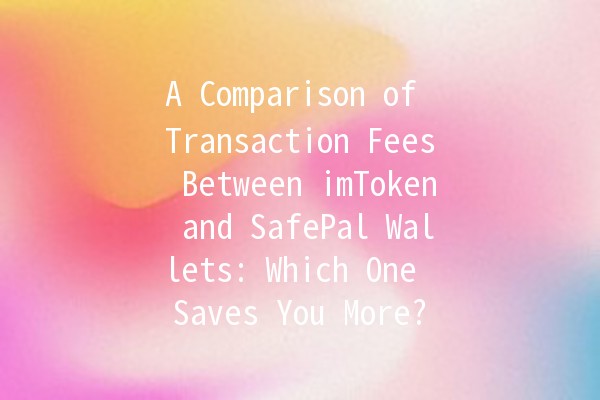In today's digital era, the choice of a cryptocurrency wallet can significantly impact your trading efficiency, especially concerning transaction fees. Both imToken and SafePal have garnered attention among crypto enthusiasts for their unique features and usability. This article explores a detailed comparison of transaction fees associated with both wallets, offering readers insights into which wallet might better suit their trading needs.
Transaction fees are charges imposed by wallets for processing cryptocurrency transactions. These fees can vary significantly based on multiple factors including the blockchain congestion, the type of transaction, and the wallet being used. Understanding these fees is crucial for maximizing your returns in crypto trading.

imToken is a wellestablished digital wallet that supports several blockchains and cryptocurrencies. It offers a range of features including:
UserFriendly Interface: imToken provides an intuitive design, making it suitable for both beginners and advanced users.
MultiCurrency Support: Users can store Ethereum (ETH), and tokens from the Ethereum network, along with Bitcoin (BTC) and other assets.
Decentralized Exchange Integration: imToken supports decentralized exchanges, allowing users to trade directly from their wallets without the need for an intermediary.
Enhanced Security: The wallet employs various security protocols, including hardware wallet support and a strong recovery mechanism.
ImToken typically calculates transaction fees based on the network fees paid to miners for processing transactions. Depending on network conditions, the fees may vary. Users have the option to set custom transaction fees based on their urgency – higher fees can expedite transactions, while lower fees may cause delays.
Example: In a hightraffic situation, the transaction fee could range from $0.05 to $2.
SafePal is a newer wallet that aims to provide comprehensive solutions for storing and managing cryptocurrencies. Its key features include:
Hardware Wallet Integration: SafePal offers a hardware wallet option that elevates security for users with significant investments.
MultiChain Support: This wallet supports a wide variety of cryptocurrencies across several blockchains.
UserCentric Design: The wallet focuses on ease of use, featuring a simple interface for navigation.
Direct Asset Swap: Users can swap tokens directly within the wallet interface without the need for external platforms.
SafePal’s approach to transaction fees lies in aligning with network charges similar to those in imToken. Users benefit from competitive rates; however, fees can fluctuate based on various factors such as market demand and transaction volume.
Example: In general market conditions, SafePal may charge fees similar to those implemented by imToken, ranging from $0.05 to $2.00 as well, depending on transaction urgency.
Both wallets use a variable fee structure based on network conditions. However, imToken users have the flexibility to set their own fees, while SafePal might adopt a more fixed approach to ensure a seamless experience.
SafePal offers hardware wallet options, meaning users may incur slightly higher onetime costs for initial purchase and setup compared to the purely softwarefocused imToken, which may impact the overall costeffectiveness for heavy traders.
Transaction fees in SafePal may vary concerning unique features like direct asset swaps, potentially leading to a different fee structure when trading.
While both wallets typically fall into a similar fee range, users have reported perceivable differences in practical scenarios where one wallet may have lower fees due to promotional periods or network conditions.
While both wallets offer competitive transaction fees, enhancing user productivity can also yield potential savings. Here are five productivity tips for users of imToken and SafePal:
Both wallets generally come with analytics tools to track your transaction history and overall spending. By analyzing your past transactions, you can identify trends, adapt your strategies, and reduce costs associated with timing and slippage in your trading.
Using imToken's analytics, users can find out when they paid higher fees and adjust their transaction times, reducing future costs.
Understanding how to set custom fees effectively can save you money. During offpeak hours, consider lowering fees since processing times are often quicker and cheaper.
If network congestion is low, a user may set their transaction fee to the minimum, saving on costs every month.
Staying updated on market conditions can help you time your trades to take advantage of lower fees.
Tracking Ethereum network activity can signal lower fees and guide users to execute transactions at optimal times.
Both wallets support multiple cryptocurrencies. Researching and utilizing alternative coins can lead to lower transaction fees compared to popular assets.
Using tokens that represent value on less congested networks can save you fees if you frequently swap.
For traders making regular transactions, automation can save time and reduce the risk of making rushed decisions that could lead to higher transaction fees.
Setting up recurring transactions during lower fee periods can lock in savings and minimize wasted resources.
The average transaction fees for both wallets range from $0.05 to $2.00, depending on network conditions and transaction types. Users can adjust fees based on their urgency.
Both wallets typically do not impose hidden fees; however, users should monitor network fees as they can fluctuate based on market activities.
Consider timing your transactions for offpeak hours, utilizing analytics tools for optimal fee settings, and adopting alternative cryptocurrencies that may offer lower fees.
While transaction fees primarily depend on network conditions for both wallet types, hardware wallets may incur initial purchases and setup costs, affecting overall wallet management expenses.
Once a transaction is initiated, the fees attached typically remain fixed, but network congestion could delay processing times.
Using decentralized applications (DApps) allows users to engage directly with smart contracts, which may involve additional fees based on the specific interactions chosen.
By understanding the transaction fees associated with imToken and SafePal, as well as leveraging ways to enhance trading efficiency and reduce overall costs, users can make more informed decisions about which wallet best suits their cryptocurrency management needs. Enjoy exploring these wallets to find the best fit for your financial strategy!